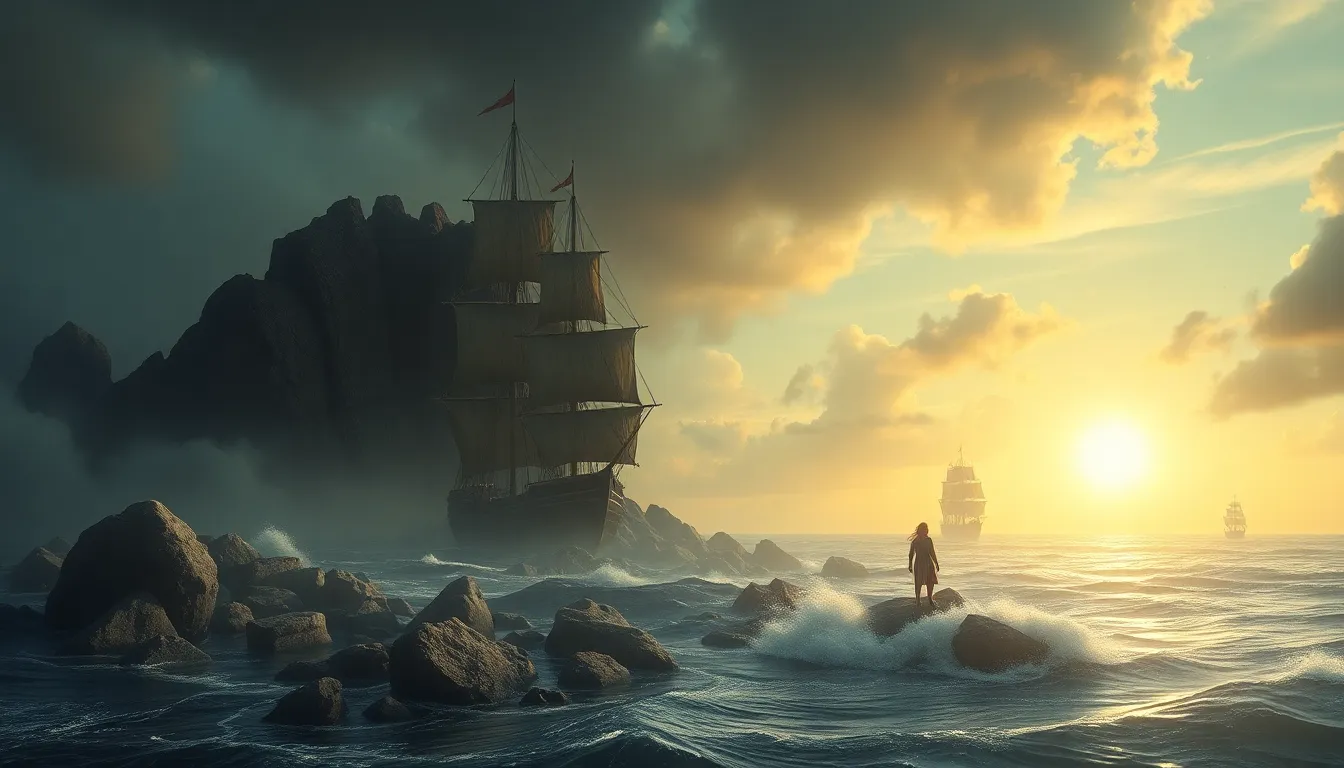The Island of the Lost: Myths of Shipwrecked Souls
I. Introduction
The allure of shipwrecks has captivated the human imagination across cultures and eras. From ancient legends to modern tales, shipwrecks symbolize not only physical loss but also the deeper existential themes of life, death, and survival. The concept of the “Island of the Lost” emerges as a mythological space where shipwrecked souls find themselves adrift, both literally and metaphorically.
This article aims to explore the myths surrounding shipwrecks, delving into their historical context, cultural interpretations, and the psychological implications they carry. By examining these narratives, we can better understand their impact on society and culture.
II. Historical Context of Shipwrecks
A. Notable historical shipwrecks and their stories
Throughout history, numerous shipwrecks have left indelible marks on maritime lore. Some notable examples include:
- The Titanic: Perhaps the most famous shipwreck in history, the sinking of the Titanic in 1912 has been memorialized in countless stories, emphasizing themes of hubris and tragedy.
- The Essex: The whaling ship that was sunk by a sperm whale in 1820, inspiring Herman Melville’s “Moby Dick,” highlighting survival and desperation.
- The Vasa: The Swedish warship that sank on its maiden voyage in 1628, it serves as a reminder of the dangers of overconfidence in engineering and design.
B. The role of maritime disasters in shaping coastal communities
Maritime disasters have profoundly influenced the development of coastal communities. Often, these events led to:
- Economic shifts: Communities relied on salvage operations and maritime industries to rebuild.
- Cultural identity: Local legends grew around shipwrecks, shaping the community’s identity and history.
- Tourism: Many coastal towns now embrace their shipwreck heritage as a means of attracting tourists.
C. How shipwrecks have influenced local legends and myths
Shipwrecks frequently serve as the foundation for local folklore, giving rise to narratives that transcend generations. Tales of ghost ships, treasure-laden wrecks, and vengeful spirits have emerged, enhancing the mystique of the sea.
III. The Island of the Lost: A Mythological Overview
A. Definition and characteristics of the “Island of the Lost”
The “Island of the Lost” often represents a liminal space where shipwrecked souls wander. Characteristics of this mythical island include:
- Isolation: The island serves as a metaphor for the isolation felt by those who have suffered great loss.
- Transformation: It is often depicted as a place of personal transformation, where characters confront their pasts.
- Danger and mystery: The island is fraught with peril, embodying the unknown that accompanies loss.
B. Origin stories from various cultures
Many cultures have their own versions of the “Island of the Lost.” Some examples include:
- Greek mythology: The myth of Odysseus, who encounters various islands on his journey home, each representing different trials.
- Polynesian legends: Stories of spirits who linger on islands, seeking redemption for their untimely deaths at sea.
- Caribbean folklore: Tales of the “Elusive Island” where shipwrecked sailors are said to be trapped for eternity.
C. Common themes found in myths about shipwrecked souls
Across these narratives, several common themes emerge, including:
- Redemption: Many stories focus on the possibility of redemption for lost souls.
- Survival: The struggle to survive against the odds is a prevalent motif.
- Memory and loss: These myths often reflect on the nature of memory and the pain of loss.
IV. Psychological and Symbolic Interpretations
A. The symbolism of the shipwreck as a metaphor for loss and transformation
Shipwrecks symbolize profound loss, representing both the end of life as it was known and the potential for transformation. This duality plays a crucial role in how individuals process grief and change.
B. Psychological interpretations of isolation and survival
Psychologically, shipwrecks compel individuals to confront their fears and the primal instincts of survival. The isolation experienced by shipwrecked souls evokes deep existential questions about one’s place in the world.
C. The idea of the “lost soul” and its cultural significance
The concept of the “lost soul” resonates across cultures, symbolizing those who are adrift in life—whether due to trauma, loss, or existential crises. This motif reflects a universal struggle for meaning and belonging.
V. Folklore and Literature: Shipwrecks in Storytelling
A. Analysis of famous literary works featuring shipwrecks
Shipwrecks have been pivotal in literature, often serving as a backdrop for character development and thematic exploration. Notable works include:
- “The Tempest” by William Shakespeare: A tale of magic, betrayal, and redemption following a shipwreck on a mysterious island.
- “Robinson Crusoe” by Daniel Defoe: The quintessential survival story, exploring themes of solitude and self-discovery.
B. The evolution of shipwreck narratives in folklore
Folklore surrounding shipwrecks has evolved, reflecting societal changes and technological advancements. Early tales were often rooted in superstition, while modern narratives may focus on psychological depth and moral lessons.
C. The impact of these stories on societal views of fate and destiny
Shipwreck stories challenge and shape societal views on fate and destiny, often depicting the struggle against predetermined outcomes. They question whether individuals can alter their paths or are merely victims of circumstance.
VI. The Role of the Ocean in Myths of Shipwrecked Souls
A. The ocean as a character in shipwreck myths
The ocean often serves as a character itself in shipwreck myths, embodying both beauty and terror. It represents the vast unknown, reflecting the complexities of human emotion.
B. Cultural perceptions of the sea as a source of danger and mystery
Across cultures, the sea is viewed with both reverence and fear. It is a source of sustenance and adventure, yet also a harbinger of disaster, shaping the myths that arise from shipwrecks.
C. The ocean’s duality: destruction and rebirth
The ocean’s duality symbolizes both destruction and rebirth, echoing the cycles of life and death. Shipwrecks serve as a poignant reminder of this cycle, where loss may lead to new beginnings.
VII. Modern Interpretations and Adaptations
A. Contemporary literature and films inspired by shipwreck myths
Modern storytelling continues to draw inspiration from shipwreck myths, with films and novels exploring themes of survival and human resilience. Examples include:
- “Life of Pi”: A tale of survival and spirituality following a shipwreck.
- “Cast Away”: Examines isolation and the human spirit in the face of adversity.
B. The resurgence of interest in maritime history and shipwreck tourism
In recent years, there has been a growing interest in maritime history, leading to the rise of shipwreck tourism. People are drawn to explore the wrecks and tales of the past, seeking connections to history and adventure.
C. How modern narratives reshape traditional myths
Contemporary narratives often reinterpret traditional shipwreck myths, infusing them with modern sensibilities and themes. This reshaping allows for a deeper exploration of identity, trauma, and resilience.
VIII. The Impact of Technology on Shipwreck Myths
A. Advances in marine technology and their role in discovering shipwrecks
Advancements in marine technology, such as sonar and underwater drones, have



